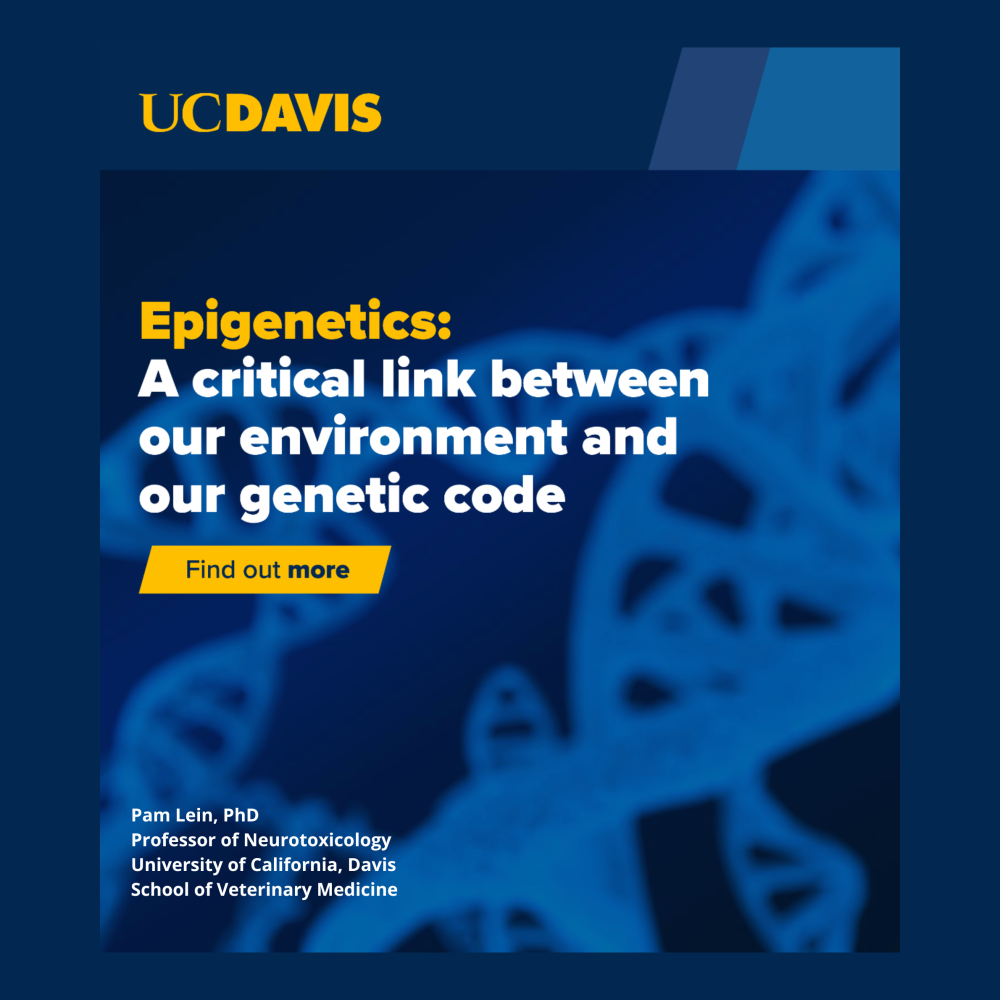Reading Between the Lines With Hong Ji, PhD
By Jennifer Biddle
Hong Ji, PhD is Associate Professor in Anatomy, Physiology, and Cell Biology at the UC Davis School of Veterinary Medicine. Jennifer Biddle interviewed Ji when she became EHSC's 2019 Environmental Health Science Scholar. Learn more about the EHS Scholar program.

From outward appearances, some might describe Hong Ji’s career in epigenetics as pre-destiny. Her life seemed to follow a prescription: Brilliant microbiology student matriculating from top universities to pursue an ever-promising research career—all with the hope of illuminating the dark mysteries of some impossible-to-cure disease.
Ji was an unusually bright and talented molecular biology student at the University of Science and Technology in Hefei, China, an internationally renowned research center. She graduated with honors in 2002 and nurtured her interest in genetics by making her way to Vanderbilt University where she earned a PhD in biology. She then pursued postdoctoral research in molecular immunology and epigenetics at Johns Hopkins University, focusing on cancer.
But a serendipitous twist of fate led Ji to choose a new path. When her husband graduated from Johns Hopkins during the Great Recession, it took months of searching before he landed a position at Procter & Gamble in Cincinnati, Ohio. Separated for several more months while job hunting for herself, Ji finally found the right position as an assistant professor at Cincinnati Children’s Hospital. Ji's new job offered her new challenges and an opportunity to pivot from cancer to asthma research.
“This is when I became interested in environmental exposures,” says Ji.
Ji chose to study asthma for many reasons. Medications could only control—not cure—the disease, and about 30 percent of children struggled to manage it, which meant the potential to help was immense. It was also a departure from diseases like cancer that typically focused on genetic mutations.
With asthma, there is a direct and clear link to the environment. Over 80 percent of children with asthma are allergic to environmental allergens like mold, dust mites or pollen. Up to 45 percent of the US population lives in areas with high traffic-related air pollution. Pollen and particulate matter are known asthma triggers and can worsen disease severity.
I want to translate my research to real life. If any of my discoveries turn into something to help prevent, intervene or treat a disease, condition or negative impact of air pollution, that would be very rewarding. Hong Ji, PhD
At Cincinnati Children's, Ji studied how environmental exposures influenced the chemical process of methylation—a core mechanism behind epigenetic regulation. Her work revealed that asthma was associated with abnormal methylation in airway epithelial cells and suggested new epigenetic pathways linked to the disease in children.
Ji’s research eventually caught the attention of Lisa Miller, PhD, a UC Davis researcher at the California National Primate Research Center (CNPRC). Miller had long collaborated with scientists at Cincinnati Children’s and was intrigued by Ji’s expertise in epigenetics and air pollution.
Miller invited Ji to apply for a National Institutes of Health (NIH) grant with her—and later encouraged her to pursue a tenure-track assistant professorship at the UC Davis School of Veterinary Medicine.
In August 2018, Ji and her family relocated to Davis, California.
At UC Davis, Ji holds an appointment in the Department of Anatomy, Physiology and Cell Biology at the School of Veterinary Medicine and serves as a core scientist in the CNPRC Respiratory Disease Unit. Her research continues using human cell lines and rodent models but now also incorporates non-human primates.
“It’s a great way to expand the picture, to better understand the mechanisms, since they have a closer relationship to human lung function," says Ji.
With the resources and collaborators available to her at UC Davis, Hong is poised to become a leader in this area. Lisa Miller, PhD
In 2019, Ji received her first R01—a prestigious five-year NIH grant—to study the epigenetic regulation of childhood asthma. It’s a key milestone for an early-stage investigator and recognition that she’s capable of running an independent research program.
She also received Pilot Project funding and support from the UC Davis Environmental Health Sciences Center (EHSC), including selection as a 2019 Environmental Health Sciences (EHS) Scholar. This funding is helping her explore how wildfire smoke affects lung development.
At CNPRC, Ji is following a cohort of adult rhesus macaques that were exposed to wildfire smoke as infants. She hopes to uncover how particulate matter from wildfire smoke affects long-term respiratory health.
“What I’m trying to identify is the long-term effect, which is precious,” she says. “I don’t think anybody has answered that question yet.”
As an EHS Scholar, Ji benefits from mentorship and career development support from nationally recognized EHSC members. The program is helping her refine her research portfolio and build the foundation for a future NIH-funded environmental epigenetics program.
“With the resources and collaborators available to her at UC Davis, Hong is poised to become a leader in this area,” Miller says.
While Ji values scientific discovery, she’s motivated by a deeper purpose: improving lives—especially children’s.
“I want to translate my research to real life,” Ji says. “If any of my discoveries turn into something to help prevent, intervene or treat a disease, condition or negative impact of air pollution, that would be very rewarding. My ultimate goal is helping children.”
What is Epigenetics?
Epigenetics is the study of how cells control genes. DNA carries genetic information telling cells to produce proteins, which in turn make the cells behave in a certain way. But what if this communication gets blocked?
Epigenetics is the mechanism cells use to block – or switch on and off – certain genes. A well-known analogy by Nessa Carey in her 2012 book The Epigenetic Revolution describes the process like a movie: DNA is the script, cells are the actors and epigenetics is the director.
Until the mid-1970s, biologists believed environment had little impact on gene expression because DNA predetermined how cells developed. But epigenetics says the environment plays a big role in how disease unfolds in the body and is inherited, explaining key mysteries like the differences between twins or how stress and malnourishment affect health.
Jennifer Biddle is a science writer, editor, and video producer at the UC Davis School of Medicine.

